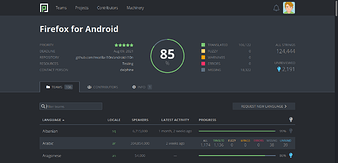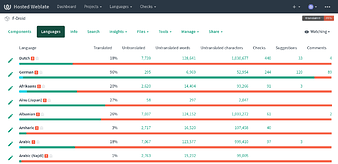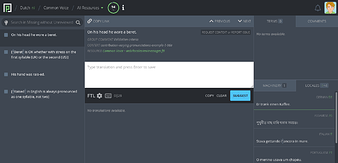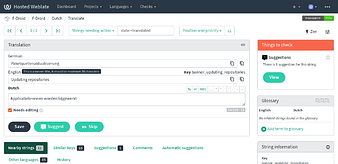Sorry, was this in reply to a specific comment? Ah, I realise it’s about your earlier comment about being able to see what checks are failing. That’s certainly helpful! Weblate documentation
I had to think a bit about what you meant, but I see now. I first thought you were suggesting that line-breaks were introduced in the string (which would be some kind of bug), but I believe you’re just referring to the linebreaks in the view.
In my Weblate set-up, I have the pretty much the same field width in Weblate & Pontoon:
Also, AntennaPod doesn’t have many linebreak in strings, so this problem/challenge would occur less frequently in our case.
Apart from this, what I think is not great about Pontoon, is the inability to mark a string as a problem. It’s very easy to tag the person responsible for a string/project (easier than in Weblate), and there are ‘Fuzzy’, ‘Warnings’ and ‘Error’ statuses for strings but I don’t see how strings can be marked or flagged as such - maybe because I have limited rights).
What’s great about Weblate, is that it has this massive ‘Translate’ button on a specific langage page within a project, which is really inviting to get started. In Pontoon it’s not clear how to get started (I’d click on ‘Missing translation’ to get those strings). Also, it supports different navigation paths:
- Project > Language > Component
- Project > Component > Language
Pontoon only offers the former.
Lastly, in Weblate it’s possible to up- & downvote suggestions - in Pontoon it’s only possible to accept/reject them.
On the other hand, what I really like about Pontoon is the clean interface:
- It’s clearer what I need to look at, and I’m not feeling insecure about where to click.
- It tells me what I need to do, and gives quick access to an overview of shortcuts.
- My ‘preferred locales’ are presented on the side, and only support me when I can’t get further with the source string (this decreases the chance on deviation from source).
- There’s not two rows with in total 7 tabs with extra information: instead, string info is displayed right below the string, human suggestions are (always) displayed below the edit field, and further info is available on the side.
Also it’s possible to set translation deadlines for projects in Pontoon, which is very useful for preparing the next release. Do you know if this is possible also in Weblate?
You mean that whenever the source text might not be abundantly clear, translators give there own spin to the text to make better, and with it, introduce unwelcome differences between languages? Yes, I have actually seen that in the past in our project. A problem indeed.
In our current platform as well is in Weblate & Pontoon it’s possible to signal such issues with the source text directly in the affected string. I guess it’s important to monitor new translations and flag up the issue if the translation deviates from the original - in that respect we need a closer community and more ‘training’. So for me the problem is (limited) investment in people, rather than technological capabilities.






